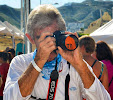A Buena Vista resident for many years emailed me recently. His subject line, “Right Before My Eyes,” caught my attention. The gist of his email was about civilization closing in on his East Cape paradise. Each day, more rules, enforcement and red tape were intruding on the laid back lifestyle that had lured him and his wife to the area in the first place.
I first arrived in East Cape in 1973, soon after Mex 1 was officially opened. The area consisted of a few hotels, Palmas de Cortez, Punta Colorada and Rancho Buena Vista, that had gained popularity with Ray Cannon’s help. In those days the area was only accessible by a ride in a hot taxi or an Air Taxi that flew out of La Paz.
The air taxi was an old rickety DC3 which sat on the runway at La Paz until there were enough passengers to make the flight to the few hotels that dotted the coastline between La Paz and Cabo San Lucas. The trip in the DC3 was an adventure in itself as the pilot had to turn the blades to get it started and had to flyover the dirt strips to be sure the livestock was clear.
The hotels were rustic, offering shelter but few amenities. Home cooked meals and plenty of booze was the norm. Hot water was a bonus and most of the electricity came from generators that rumbled into the night. The only outside communication was either ham radio or later SSB Marine radios. At night with little ambient light, the bright stars lit up the dark sky.
The extraordinary fishing attracted the clients. Aside from the few locals who fished, the hotels’ fleet (combined) was only thirty boats.
Over the next decade, improvements came slowly. More hotels sprang up, more fishing boats materialized and a few adventuresome Americans began to build private homes. Federal power became a reality, not consistent, but better than the noisy generators. Roads improved, a telephone office opened first with a few phones and cubicles, providing the ability to make long distance calls. A grumpy Mexican lady who didn’t speak English ruled the telephone “office” and actually connected the caller to their party. Most groceries were purchased in La Paz, where locals did their banking.
By the mid eighties, the area came into its own. Telephone service became available for private homes, and the telephone office on the highway disappeared. Later Cellular telephone service became available…a welcome addition. Hotels grew larger and offered more amenities. More boats were added to the sportfishing fleets. Fishermen began equipping their ATVs with rod holders to carry multiple fishing rods and prowled the beaches in search of fish. The ATVs became a favored mode of transportation along the beach for visiting and bar hopping.
Then wonder of wonders, Cabo Pulmo was declared a Marine Preserve set aside for diving only and no fishing allowed.
The nineties brought ATV rentals; more, larger, expensive houses were built along the beaches, in some places side by side like track homes in the U.S.
One custom home that spilled down the face of the cliff to the beach actually was featured in Architectural Digest. Service clubs were established. Women’s Bunko met weekly to exchange gossip, have a cocktail or two with lunch during the game. An annual Shakespeare Festival was born and the retirees competed for the parts. Art Festivals, Bocce Ball Tournaments, Fishing Clubs, Gardening Clubs were formed to satisfy the residents’ need to feel at home.
The Millennium arrived with much fanfare; real estate prices soared. Internet connections via DSL replaced VHF radios as the favored means of communication. Mini shopping centers sprang up, then a pitch and a putt golf course. ATMs, then a real bank, a vet clinic, and a new emergency medical clinic,
Paved streets and street lights were pointed to with pride by the recent immigrants to Baja. Hotel properties changed hands with new owners promising bigger and better. All these changes were hailed as signs of how far they had come in improving the innocent small Mexican village.
Recently more changes included. PROFEPA, a Mexican version of EPA, visits homes and beaches demanding clean up and evidence of permits. Cabo Pulmo Marine Reserve is being policed to enforce no fishing in the area. The Port Captain is checking to be certain anglers have valid fishing licenses and respect catch limits. These changes are what were needed, but before their eyes, they realized that the changes may have shattered the unstructured, laid back Eden they had once searched for and thought they had found.
While this is happening in one small community in Baja, it is being repeated time after time up and down the Baja Peninsula before everyone’s eyes!
